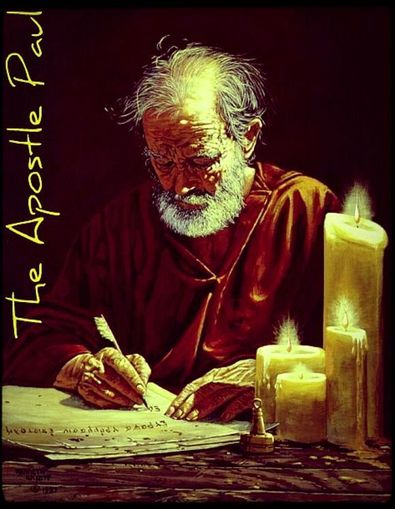I Samuel 17; Psalm 9:9-20; II Corinthians 6:1-13; Mark 4:35-41

Did you notice a theme running through all of our Scripture readings this mornings, especially the narrative ones about three great men: David, Paul and Jesus?
They all had to do with power, the power of men, specifically the power of self-confidence.
First, let’s look at David. At this point he’s still without any proven track record as a warrior. In fact, the things he has in his favor hardly inspire anyone else, least of all King Saul, to think of him as a potential giant-killer, certainly not a giant who was something like 9 feet, 10 inches tall when you add up cubits and toss in a hand’s-breadth. David’s salient attributes included youth, something most of us admire from a distance; good looks, beautiful eyes, and a ruddy complexion (apparently there was no Oil of Olay in his day). But he was brimming with self-confidence: look at verses 34, 35 and 37. David truly believed that he was up to the task.
Second, let’s look at Paul. We have a number of testimonies from Paul in his writings that reveal him as a very positive and confident chap, even though there are suggestions here and there that he was short, had really bad eyes, and was not particularly good-looking. Yet see what he writes in verses 3 and 4 about how he first came to the Corinthians.
Then, third, there’s Jesus. According to Isaiah, speaking prophetically in chapter 53, “there was no form nor comeliness about Him that we should look on Him.” Isaiah even adds that He was “like one from Whom men hide their face.” Yet this fascinating story in Mark’s Gospel portrays Him as a completely confident Person. After all, He’s the only one sleeping on this boat. Perhaps He’s trusting that His disciples, a group that includes veteran second-generation fishermen quite accustomed to navigating the unpredictable waters of the Sea of Galilee, will get on just fine. But He sleeps away while they’re fearing for their lives. They finally rouse Him and then, in the fewest possible words (only 2 in Greek), Jesus simply says, “Hush, be still,” and the winds immediately become calm. There’s self-confidence for you!
How am I doing so far? Do you think I’m on to something? Are all these stories truly about human self-confidence and the power of men? If you think I’m right, then we need to take another look at all 3 passages.
First, David. Let’s read from verses 45-47. Apparently David’s confidence had absolutely nothing to do with self-confidence, but with the greatest imaginable confidence in the power of God. Suddenly he sets aside his earlier exploits with lions and bears, and lays claim solely to the strength of the Lord, Whose battle this is and Who will deliver David and his people.
Second, we need to read Paul’s words from a different perspective. Yes, it’s true that Paul first enumerates all the trials and tribulations he went through in order to bring the Gospel to the church at Corinth. But then he turns on a dime in verses 6 and 7, where he explains how he really came to them. Earlier in his first epistle to the Corinthian believers, he had written these words: I Corinthians 1:23a & 24b; I Cor. 2:2, 4 & 5. Clearly Paul, like David, attributed all his successes to the power of God.
Third, we look once again at the Person of Jesus, the only human being Who ever lived with the right to claim power on His own. After He calmed the wind and the waves, His disciples marveled and asked among themselves what kind of Person this could be. But when we turn to the words of Jesus in the 5th chapter of John’s Gospel, here’s what we hear: “The Son can do nothing of Himself, unless it is something He sees the Father doing; for whatever the Father does, these things the Son also does in like manner. The works that the Father has given Me to accomplish – the very works that I do – testify about Me, that the Father has sent Me” (vss. 19, 36). Even the incarnate Son of God traced the source of His powerful acts directly back to the Father: to the power of an omnipotent, Almighty God.
What can we conclude from this for ourselves? What’s our takeaway? These great stories about 3 great men all share a common thread. It’s that no power in the purely human realm can begin to compare to the power that’s from God alone. David should have been “crushed like a bug” by the giant Goliath. Paul, on his own, should have been ridiculed and dismissed without anyone accepting his Gospel message. Jesus, apart from the power of God at work in His life, might have sunk to the bottom of the Sea of Galilee with the rest of His disciples. And we need to concede that our own best efforts, even the ones that seem successful in human terms, are feeble when compared to what we’re enabled to accomplish in the strength of God.
How do I know this? Just listen to these promises of Jesus:
Luke 24:49 – “I will send you the promise of My Father… (and) you will be clothed with power from on high.” This is the promise of the Holy Spirit, of Holy Spirit power.
Matthew 28:20 – After giving the Great Commission for us to be making disciples and baptizing them in the Name of the Father and of the Son and of the Holy Spirit, Jesus promises, “Lo, I am with you always, even to the end of the age.” And earlier in the same chapter, Jesus prefaces His promise with this assurance: “All power is given to Me in heaven and on earth.”
This is not power that Jesus keeps to Himself. In Acts 1:8, immediately before He ascended to His Father’s right hand in heaven, Jesus said to the disciples gathered around Him, “You will receive power when the Holy Spirit has come on you, and you will be My witnesses to the ends of the earth.” This means that we’re to become part of that great power chain that originates with the Father, is manifested in the works of the Son, is given to the disciples and ultimately is passed on to us and to all who will come to faith through our witness. That’s a chain that we must keep going!
Real power is decidedly not the power of human self-confidence. It’s the power of God. And that power is mediated to us in 3 ways:
- First, it’s mediated through faith. John 1:12 – “As many as received Him (that is, Jesus), to them He gave the power (or the authority) to become the children of God, even to those who believe on His Name.”
- Then it’s mediated through the Holy Spirit, as we saw in Luke 24:49 – “You will be clothed with power from on high;” and in Acts 1:8 - “You will receive power when the Holy Spirit has come on you.”
- And third, that power continually is mediated to us through the message of the Gospel, in which we should be immersing ourselves daily. Why would we willingly neglect accessing this great power source? The Apostle Paul wrote to the Romans, “I am not ashamed of the Gospel, for it is the power of God unto salvation to all who believe, to the Jew first and also to the Gentile” (1:16).
[It was our amazing and unparalleled privilege this past week to witness the power of God at work among nearly 2,000 believers gathered from the 4 corners of the earth to worship, to sing praises, to raise their hands and hearts and voices, to pray together, to share together, to tell stories of God’s miraculous acts in places where persecution in the Name of Jesus remains rampant in our time. Together we prayed for the peace of Jerusalem. And together we recommitted ourselves to ”proclaiming Christ faithfully to the Nations.” That was the theme of GAFCON 2018 in Jerusalem, and we shouted it out together each day. Now it’s our prayer that the power of God we witnessed in this astonishing gathering of faithful believers will continue to show itself in our own lives and in the lives of all who experienced it with us. And, as we sang together in conclusion, “To God be the glory: great things He has done.”]
In the Name of the Father and of the Son and of the Holy Spirit, Amen


 RSS Feed
RSS Feed


